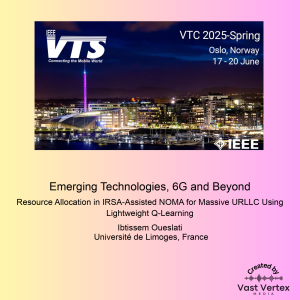

VTC 2025 Spring Conference’s Shorts
Resource Allocation in IRSA-Assisted NOMA for Massive URLLC Using Lightweight Q-Learning
2025-06-13
Ultra-Reliable Low-Latency Communication is the Fifth Generation (5G) use case with the most stringent requirements for latency and reliability. In Beyond 5G and future 6G systems, there will be a need to support a large number of URLLC devices, giving rise to a new use case known as massive URLLC (mURLLC). Addressing these demands requires efficient resource sharing among multiple devices. Non-Orthogonal Multiple Access (NOMA) emerges as an efficient solution to enhance spectral efficiency by...
Ultra-Reliable Low-Latency Communication is the Fifth Generation (5G) use case with the most stringent requirements for latency and reliability. In Beyond 5G and future 6G systems, there will be a need to support a large number of URLLC devices, giving rise to a new use case known as massive URLLC (mURLLC). Addressing these demands requires efficient resource sharing among multiple devices. Non-Orthogonal Multiple Access (NOMA) emerges as an efficient solution to enhance spectral efficiency by allowing simultaneous transmissions from multiple devices over shared resources. In this paper, we propose a novel joint sub-channel allocation and power control framework that integrates Irregular Repetition Slotted ALOHA (IRSA) with Grant-Free NOMA (GF-NOMA). The resource allocation problem is formulated as a multi-agent reinforcement learning task, where each device acts as a learning agent and the gNodeB (gNB) broadcasts global feedback to meet the stringent reliability and latency requirements. The framework introduces new Quality Scores (QS) that guide agents in selecting resources more efficiently. Extensive simulations demonstrate that the proposed framework significantly outperforms existing techniques in meeting the stringent mURLLC requirements.
Resource Allocation in IRSA-Assisted NOMA for Massive URLLC Using Lightweight Q-Learning
Ibtissem OUESLATI, University of Limoges; Oussama Habachi, LIMOS; Jean-Pierre Cances, ENSIL; Essaid Sabir, Teluq University; Vahid Meghdadi, University of Limoges
View more
Resource Allocation in IRSA-Assisted NOMA for Massive URLLC Using Lightweight Q-Learning
Ibtissem OUESLATI, University of Limoges; Oussama Habachi, LIMOS; Jean-Pierre Cances, ENSIL; Essaid Sabir, Teluq University; Vahid Meghdadi, University of Limoges
Comments (3)


